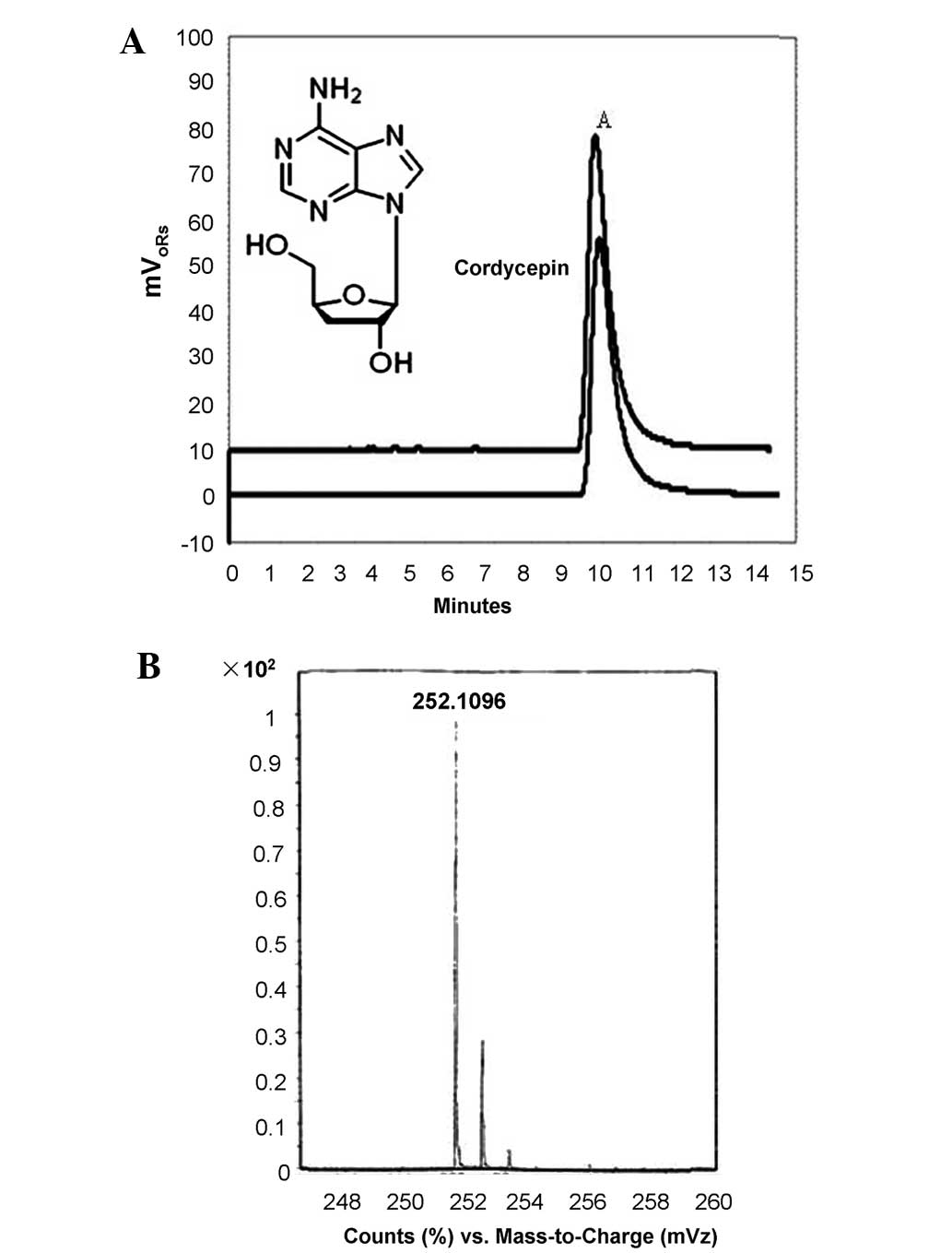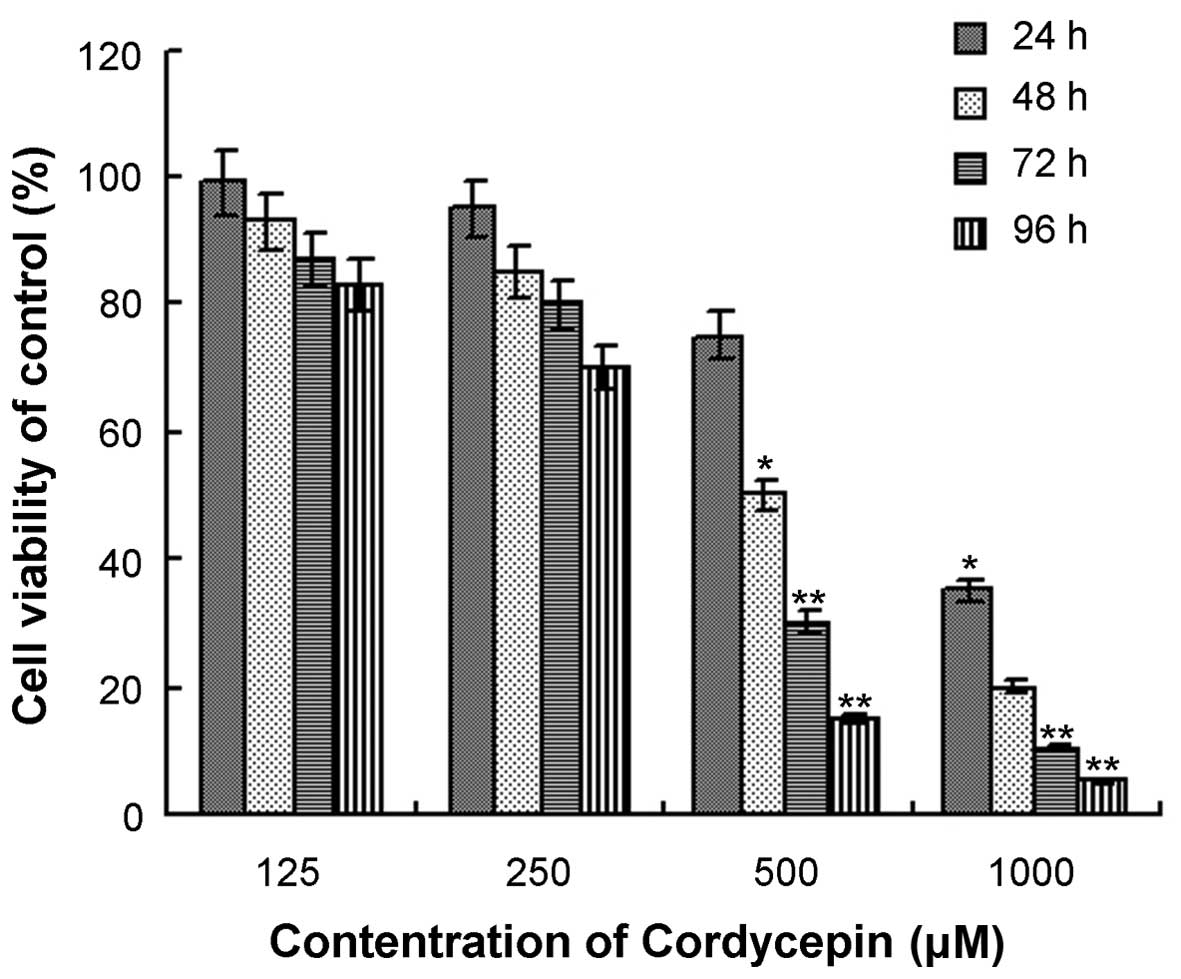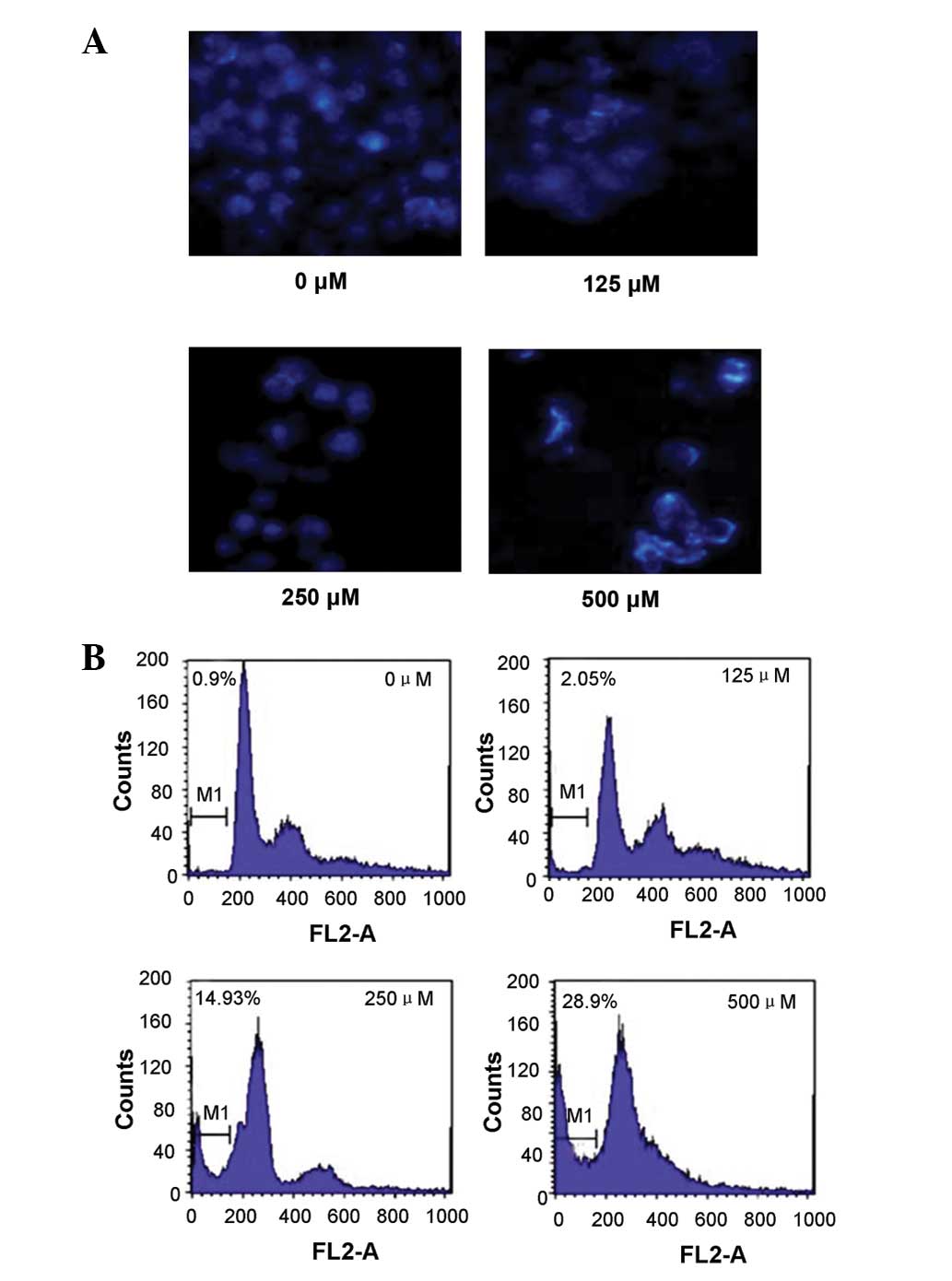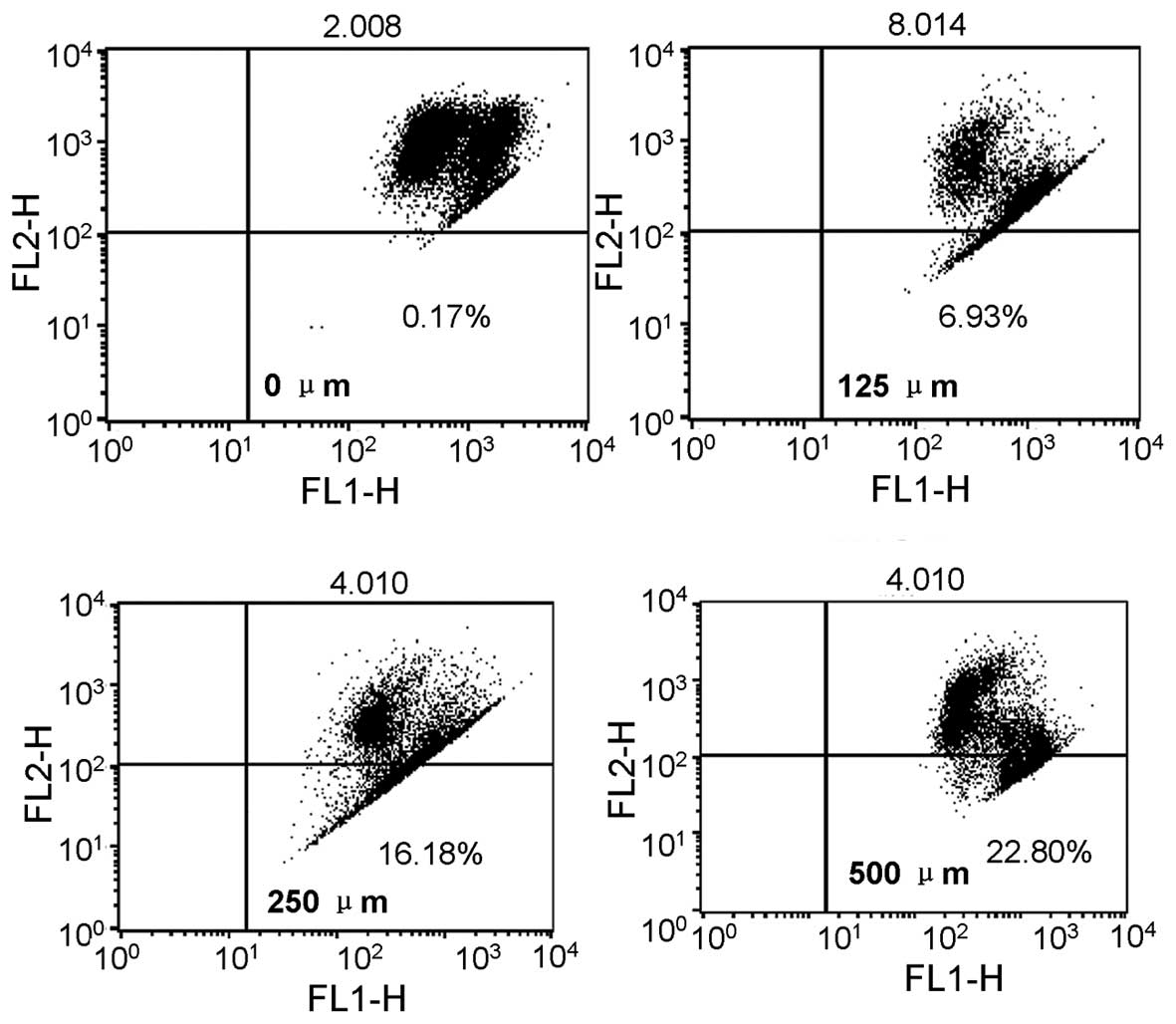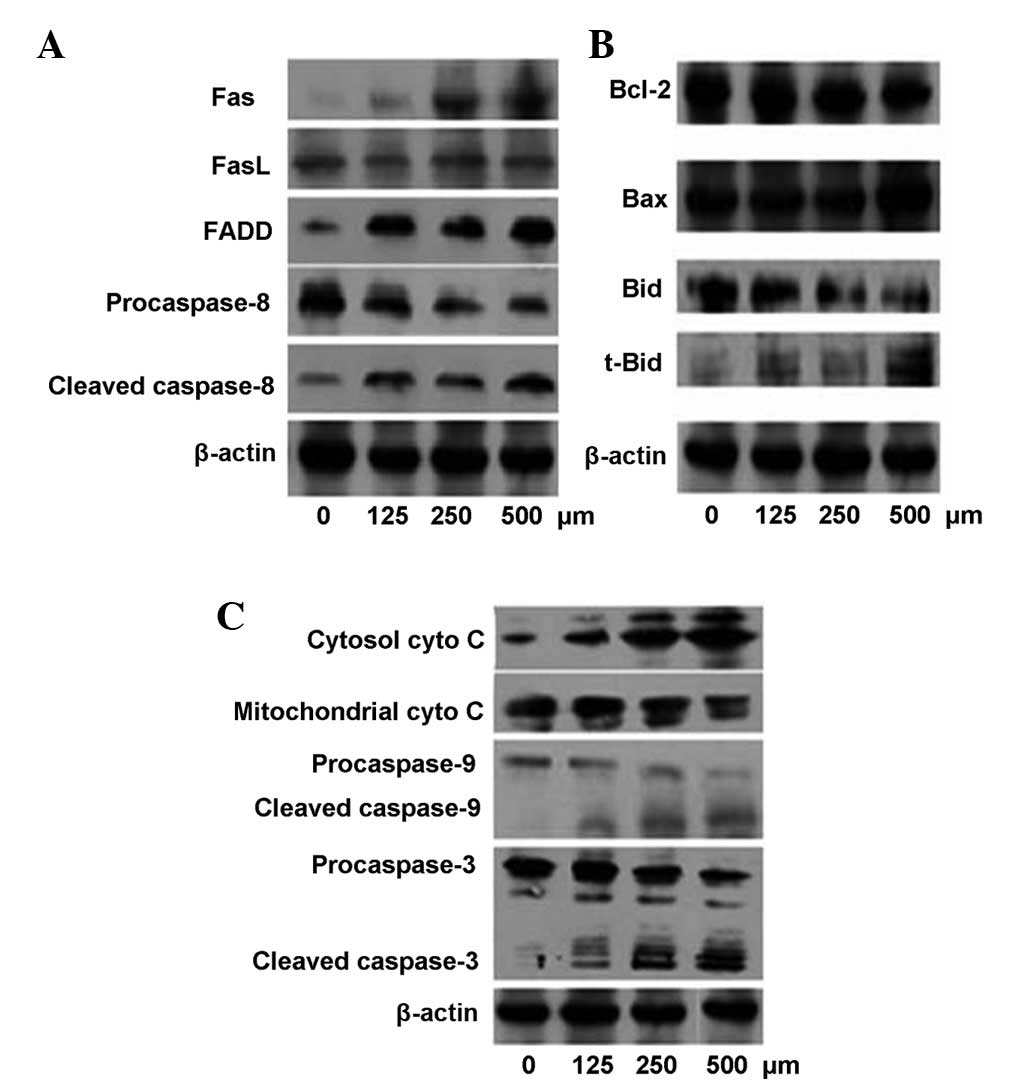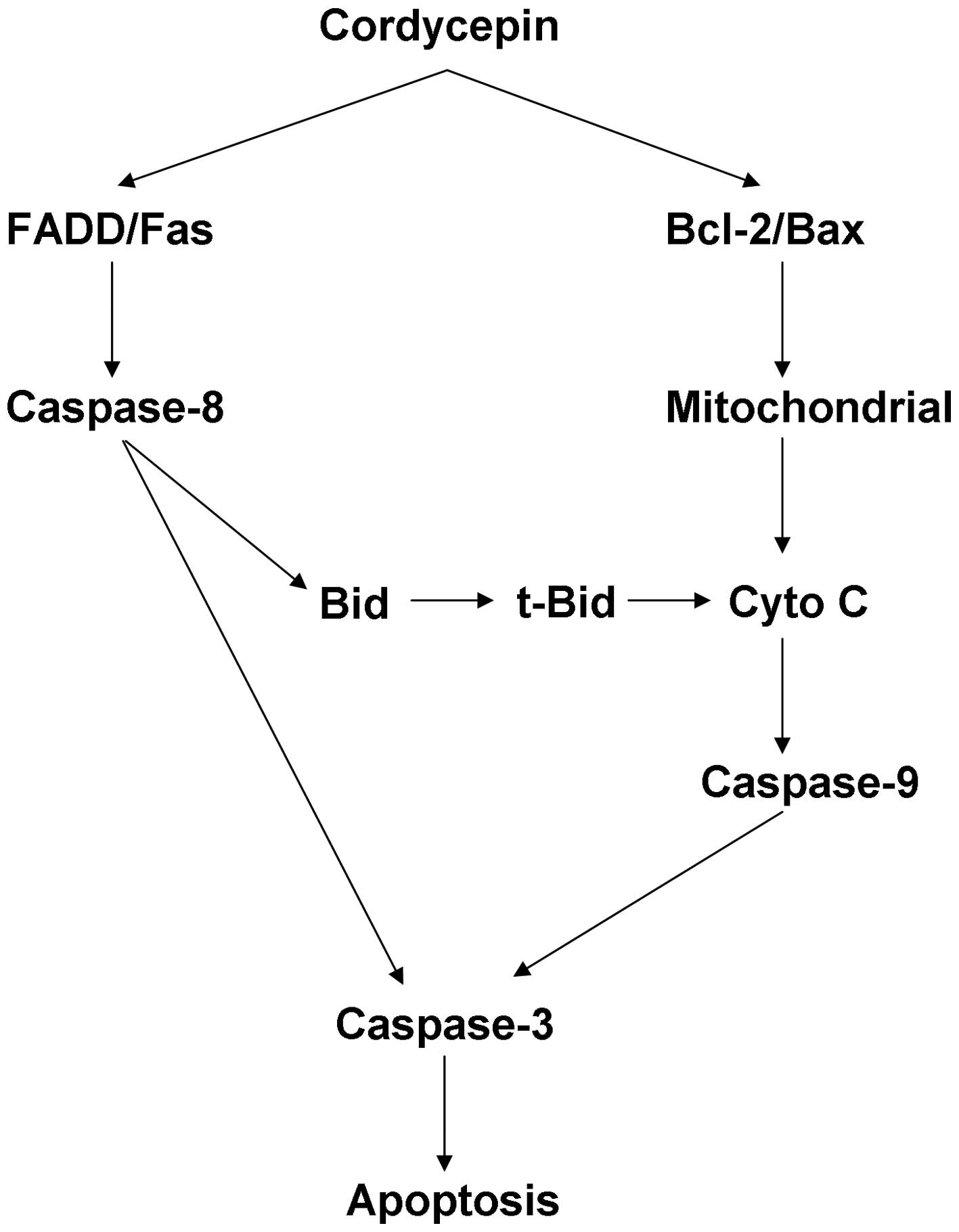|
1
|
Won SY and Park EH: Anti-inflammatory and
related pharmacological activities of cultured mycelia and fruiting
bodies of Cordyceps militaris. J Ethnopharmacol. 96:555–561. 2005.
View Article : Google Scholar : PubMed/NCBI
|
|
2
|
Yoo HS, Shin JW, Cho JH, Son CG, Lee YW,
Park SY and Cho CK: Effects of Cordyceps militaris extract on
angiogenesis and tumor growth. Acta Pharmacol Sin. 25:657–665.
2004.PubMed/NCBI
|
|
3
|
Hattori M, Isomura S, Yokoyama E, Ujita M
and Hara A: Extracellular trypsin-like proteases produced by
Cordyceps militaris. J Biosci Bioeng. 100:631–636. 2005. View Article : Google Scholar : PubMed/NCBI
|
|
4
|
Park C, Hong SH, Lee JY, Kim GY, Choi BT,
Lee YT, Park DI, Park YM, Jeong YK and Choi YH: Growth inhibition
of U937 leukemia cells by aqueous extract of Cordyceps militaris
through induction of apoptosis. Oncol Rep. 13:1211–1216.
2005.PubMed/NCBI
|
|
5
|
Zhang G, Huang Y, Bian Y, Wong JH, Ng TB
and Wagn H: Hypoglycemic activity of the fungi Cordyceps militaris,
Cordyceps sinensis, Tricholoma mongolicum and Omphalia lapidescens
in streptozotocin-induced diabetic rats. Appl Microbiol Biotechnol.
72:1152–1156. 2006. View Article : Google Scholar : PubMed/NCBI
|
|
6
|
Ohta Y, Lee JB, Hayashi K, Fujita A, Park
DK and Hayashi T: In vivo anti-influenza virus activity of an
immunomodulatory acidic polysaccharide isolated from Cordyceps
militaris grown on germinated soybeans. J Agric Food Chem.
55:10194–10199. 2007. View Article : Google Scholar : PubMed/NCBI
|
|
7
|
Lee H, Kim YJ, Kim HW, Lee DH, Sung MK and
Park T: Induction of apoptosis by Cordyceps militaris through
activation of caspase-3 in leukemia HL-60 cells. Biol Pharm Bull.
29:670–674. 2006. View Article : Google Scholar : PubMed/NCBI
|
|
8
|
Xu FL, Lee YL, Tsai WY, Lin SJ, Yang ZQ,
Yang CC, Liu HY, Cheng L, Xiao H and Wen L: Effect of cordycepin on
Hantaan virus 76–118 infection of primary human embryonic pulmonary
fibroblasts-characterization of apoptotic effects. Acta Virol.
49:183–193. 2005.PubMed/NCBI
|
|
9
|
Nakamura K, Konoha K, Yoshikawa N,
Yamaguchi Y, Kagota S, Shinozuka K and Kunitomo M: Effect of
cordycepin (3′-deoxyadenosine) on hematogenic lung metastatic model
mice. In Vivo. 19:137–141. 2005.PubMed/NCBI
|
|
10
|
Nakamura K, Yoshikawa N, Yamaguchi Y,
Kagota S, Shinozuka K and Kunitomo M: Antitumor effect of
cordycepin (3′-deoxyadenosine) on mouse melanoma and lung carcinoma
cells involves adenosine A3 receptor stimulation. Anticancer Res.
26:43–47. 2006.PubMed/NCBI
|
|
11
|
Yoshikawa N, Nakamura K, Yamaguchi Y,
Kagota S, Shinozuka K and Kunitomo M: Antitumour activity of
cordycepin in mice. Clin Exp Pharmacol Physiol. 31(Suppl 2):
S51–S53. 2004. View Article : Google Scholar : PubMed/NCBI
|
|
12
|
Lee SJ, Kim SK, Choi WS, Kim WJ and Moon
SK: Cordycepin causes p21WAF1-mediated G2/M cell-cycle arrest by
regulating c-Jun N-terminal kinase activation in human bladder
cancer cells. Arch Biochem Biophys. 490:103–109. 2009. View Article : Google Scholar : PubMed/NCBI
|
|
13
|
Zhou X, Luo L, Dressel W, Shadier G,
Krumbiegel D, Schmidtke P, Zepp F and Meyer CU: Cordycepin is an
immunoregulatory active ingredient of Cordyceps sinensis. Am J Chin
Med. 36:967–980. 2008. View Article : Google Scholar : PubMed/NCBI
|
|
14
|
Shin S, Lee S, Kwon J, Moon S, Lee S, Lee
CK, Cho K, Ha NJ and Kim K: Cordycepin suppresses expression of
diabetes regulating genes by inhibition of
lipopolysaccharide-induced inflammation in macrophages. Immune
Netw. 9:98–105. 2009. View Article : Google Scholar : PubMed/NCBI
|
|
15
|
Thomadaki H, Scorilas A, Tsiapalis CM and
Havredaki M: The role of cordycepin in cancer treatment via
induction or inhibition of apoptosis: Implication of
polyadenylation in a cell type specific manner. Cancer Chemother
Pharmacol. 61:251–265. 2008. View Article : Google Scholar : PubMed/NCBI
|
|
16
|
Zhou X, Meyer CU, Schmidtke P and Zepp F:
Effect of cordycepin on interleukin-10 production of human
peripheral blood mononuclear cells. Eur J Pharmacol. 453:309–317.
2002. View Article : Google Scholar : PubMed/NCBI
|
|
17
|
Guo P, Kai Q, Gao J, Lian ZQ, Wu CM, Wu CA
and Zhu HB: Cordycepin prevents hyperlipidemia in hamsters fed a
high-fat diet via activation of AMP-activated protein kinase. J
Pharmacol Sci. 113:395–403. 2010. View Article : Google Scholar : PubMed/NCBI
|
|
18
|
Lomonosova E and Chinnadurai G: BH3-only
proteins in apoptosis and beyond: An overview. Oncogene. 27(Suppl
1): S2–S19. 2008. View Article : Google Scholar : PubMed/NCBI
|
|
19
|
Seitz SJ, Schleithoff ES, Koch A, Schuster
A, Teufel A, Staib F, Stremmel W, Melino G, Krammer PH, Schilling T
and Müller M: Chemotherapy-induced apoptosis in hepatocellular
carcinoma involves the p53 family and is mediated via the extrinsic
and the intrinsic pathway. Int J Cancer. 126:2049–2066.
2010.PubMed/NCBI
|
|
20
|
Lee SY, Debnath T, Kim SK and Lim BO:
Anti-cancer effect and apoptosis induction of cordycepin through
DR3 pathway in the human colonic cancer cell HT-29. Food Chem
Toxicol. 60:439–447. 2013. View Article : Google Scholar : PubMed/NCBI
|
|
21
|
Lee HH, Park C, Jeong JW, Kim MJ, Seo MJ,
Kang BW, Park JU, Kim GY, Choi BT, Choi YH and Jeong YK: Apoptosis
induction of human prostate carcinoma cells by cordycepin through
reactive oxygen species-mediated mitochondrial death pathway. Int J
Oncol. 42:1036–1044. 2013.PubMed/NCBI
|
|
22
|
Chen YH, Wang JY, Pan BS, Mu YF, Lai MS,
So EC, Wong TS and Huang BM: Cordycepin enhances cisplatin
apoptotic effect through caspase/MAPK pathways in human head and
neck tumor cells. Onco Targets Ther. 6:983–998. 2013.PubMed/NCBI
|
|
23
|
Sytwu HK, Liblau RS and McDevitt HO: The
roles of Fas/APO-1 (CD95) and TNF in antigen-induced programmed
cell death in T cell receptor transgenic mice. Immunity. 5:17–30.
1996. View Article : Google Scholar : PubMed/NCBI
|
|
24
|
Lien YC, Daosukho C and St Clair DK: TNF
receptor deficiency reveals a translational control mechanism for
adriamycin-induced Fas expression in cardiac tissues. Cytokine.
33:226–230. 2006. View Article : Google Scholar : PubMed/NCBI
|
|
25
|
Grunert M, Gottschalk K, Kapahnke J,
Gündisch S, Kieser A and Jeremias I: The adaptor protein FADD and
the initiator caspase-8 mediate activation of NF-κB by TRAIL. Cell
Death Dis. 3:e4142012. View Article : Google Scholar : PubMed/NCBI
|
|
26
|
Saggioro FP, Neder L, Stavale JN,
Paixão-Becker AN, Malheiros SM, Soares FA, Pittella JE, Matias CC,
Colli BO, Carlotti CG and Franco M: Fas, FasL and cleaved caspases
8 and 3 in glioblastomas: A tissue microarray-based study. Pathol
Res Pract. 210:267–273. 2014. View Article : Google Scholar : PubMed/NCBI
|
|
27
|
Kaufmann T, Strasser A and Jost PJ: Fas
death receptor signalling: Roles of Bid and XIAP. Cell Death
Differ. 19:42–50. 2012. View Article : Google Scholar : PubMed/NCBI
|
|
28
|
Vogel A, Aslan JE, Willenbring H, Klein C,
Finegold M, Mount H, Thomas G and Grompe M: Sustained
phosphorylation of Bid is a marker for resistance to Fas-induced
apoptosis during chronic liver diseases. Gastroenterology.
130:104–119. 2006. View Article : Google Scholar : PubMed/NCBI
|
|
29
|
Schmich K, Schlatter R, Corazza N,
Ferreira Sá K, Ederer M, Brunner T, Borner C and Mergort I: Tumor
necrosis factor α sensitizes primary murine hepatocytes to
Fas/CD95-induced apoptosis in a Bim- and Bid-dependent manner.
Hepatology. 53:282–292. 2011. View Article : Google Scholar : PubMed/NCBI
|
|
30
|
Liu G, Wang T, Wang T, Song J and Zhou Z:
Effects of apoptosis-related proteins caspase-3, Bax and Bcl-2 on
cerebral ischemia rats. Biomed Rep. 1:861–867. 2013.PubMed/NCBI
|
|
31
|
Hu Q, Cui X, Tao L, Xiu L, Wang T and Wang
X: Staphylococcus aureus induces apoptosis in primary bovine
mammary epithelial cells through Fas-FADD death receptor-linked
caspase-8 signaling. DNA Cell Biol. 33:388–397. 2014. View Article : Google Scholar : PubMed/NCBI
|
|
32
|
Jung EB and Lee CS: Baicalein attenuates
proteasome inhibition-induced apoptosis by suppressing the
activation of the mitochondrial pathway and the caspase-8- and
Bid-dependent pathways. Eur J Pharmacol. 730:116–124. 2014.
View Article : Google Scholar : PubMed/NCBI
|
|
33
|
Wang J and Li W: Discovery of novel second
mitochondria-derived activator of caspase mimetics as selective
inhibitor of apoptosis protein inhibitors. J Pharmacol Exp Ther.
349:319–329. 2014. View Article : Google Scholar : PubMed/NCBI
|
|
34
|
Gómez-Crisóstomo NP, López-Marure R,
Zapata E, Zazueta C and Martínez-Abundis E: Bax induces cytochrome
c release by multiple mechanisms in mitochondria from MCF7
cells. J Bioenerg Biomembr. 45:441–448. 2013. View Article : Google Scholar : PubMed/NCBI
|
|
35
|
De Martino L, Marfé G, Longo M, Fiorito F,
Montagnaro S, Iovane V, Decaro N and Pagnini U: Bid cleavage,
cytochrome c release and caspase activation in canine
coronavirus-induced apoptosis. Vet Microbiol. 141:36–45. 2010.
View Article : Google Scholar : PubMed/NCBI
|
|
36
|
Kumar P, Coltas IK, Kumar B, Chepeha DB,
Bradford CR and Polverini P: Bcl-2 protects endothelial cells
against gamma-radiation via a Raf-MEK-ERK-survivin signaling
pathway that is independent of cytochrome c release. Cancer
Res. 67:1193–1202. 2007. View Article : Google Scholar : PubMed/NCBI
|
|
37
|
Lei X, Chen Y, Du G, Yu W, Wang X, Qu H,
Xia B, He H, Mao J, Zong W, et al: Gossypol induces
Bax/Bak-independent activation of apoptosis and cytochrome c
release via a conformational change in Bcl-2. Faseb J.
20:2147–2149. 2006. View Article : Google Scholar : PubMed/NCBI
|
|
38
|
Hajiahmadi S, Panjehpour M, Aghaei M and
Shabani M: Activation of A2b adenosine receptor regulates ovarian
cancer cell growth: involvement of Bax/Bcl-2 and caspase-3. Biochem
Cell Biol. 93:321–329. 2015. View Article : Google Scholar : PubMed/NCBI
|
|
39
|
Dastjerdi MN, Valiani A, Mardani M and Ra
MZ: Adenosine A1 receptor modifies P53 expression and apoptosis in
breast cancer cell Mcf-7. Bratisl Lek Listy. 117:242–246.
2016.PubMed/NCBI
|
|
40
|
Nagaya H, Gotoh A, Kanno T and Nishizaki
T: A3 adenosine receptor mediates apoptosis in invitro RCC4-VHL
human renal cancer cells by up-regulation AMID expression. J Urol.
189:321–328. 2013. View Article : Google Scholar : PubMed/NCBI
|















